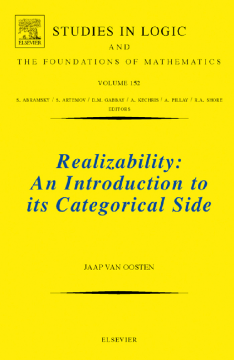
Additional Information
Book Details
Abstract
Aimed at starting researchers in the field, Realizability gives a rigorous, yet reasonable introduction to the basic concepts of a field which has passed several successive phases of abstraction. Material from previously unpublished sources such as Ph.D. theses, unpublished papers, etc. has been molded into one comprehensive presentation of the subject area.
- The first book to date on this subject area
- Provides an clear introduction to Realizability with a comprehensive bibliography
- Easy to read and mathematically rigorous
- Written by an expert in the field
"This book aims at beginning researchers in the field of realizability and so emphasizes technical tools rather than any overview of methods or results. The central object here which created the categorical approach to realizability is Martin Hyland’s effective topos called Eff. The author advises that readers interested in getting directly to that topos can skip Chapter 1 and will only need "some parts of Chapter 2" (p. xii). However, that opening material will be needed for any research career on this and other realizability toposes. The reader is assumed to know some amount of general category theory as well as to have an "acquaintance with the notion of a topos" (p. vi). The tools are presented very clearly and this is especially advantageous for the idea of a tripos. The standard reference on triposes has been Andrew Pitts’s 1982 Ph.D. dissertation [The theory of triposes. Cambridge: Univ. Cambridge (1982)]. Considerable simplification has been possible since that pioneering work. This book gives a very clear exposition and should become the reference."--Zentralblatt MATH 1225-1
